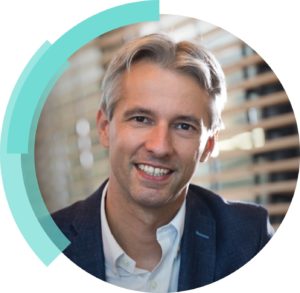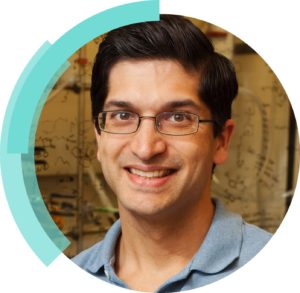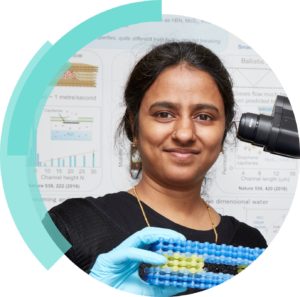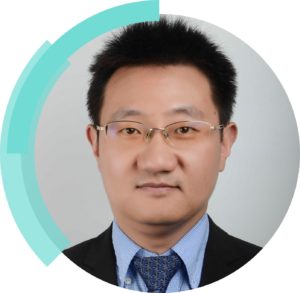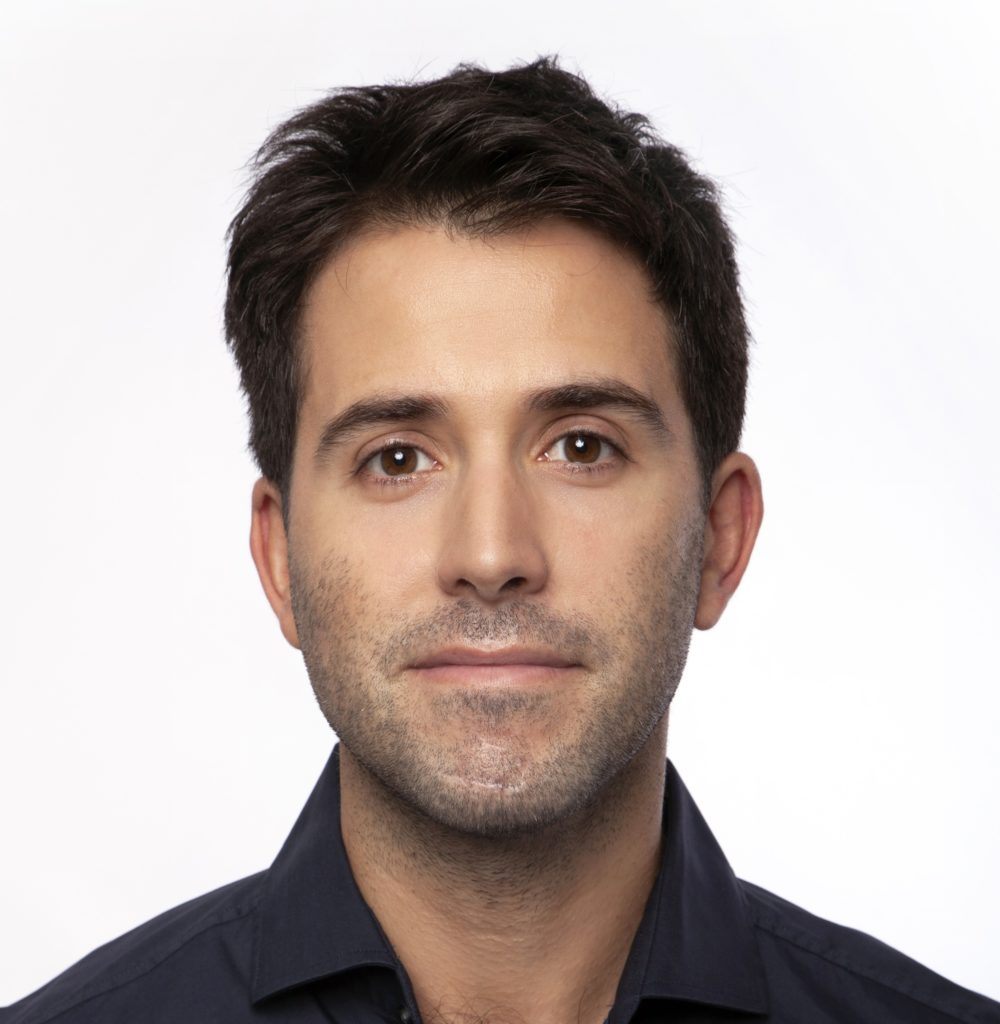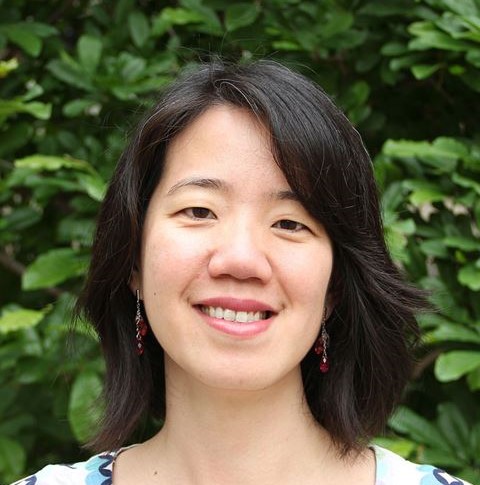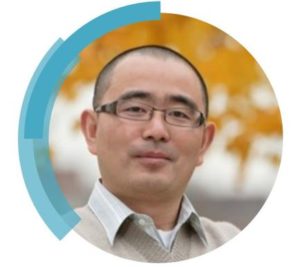On behalf of the Chemical Society Reviews Editorial Board, we are delighted to announce that the winner of the 2024 ChemSocRev Pioneering Investigator Lectureship is Professor Radha Boya (University of Manchester).
Radha joins our recent past winners Timothy Noël and Ryan Shenvi (joint 2022/23 winners), Daniele Leonori and Connie Lu (joint 2021 winners).
Get to know more about Radha below:
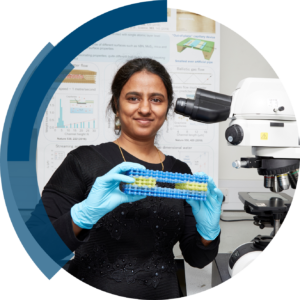
Prof. Radha Boya, FRSC is a professor, Royal Society University Research fellow in the department of Physics & Astronomy, and National Graphene Institute at the University of Manchester. Radha’s research team investigates properties of gas, liquids and ions confined in molecular scale with Angstrom (Å) -scale capillaries constructed out of one atom thin 2D-materials such as graphene.
Radha completing her PhD (2012) in Jawaharlal Nehru Centre for Advanced Scientific Research India, and her post-doctoral research at Northwestern University (2012-13) in the United States, and University of Manchester (2014-16) in UK. In Manchester, together with Prof Andre Geim, she devised nanofabrication methods to make ultimately narrow fluidic channels with angstrom-scale dimensions, by effectively removing a single atomic plane from a bulk layered crystal. Radha secured a series of international research fellowships that enabled her to rapidly build an independent career in the UK. She became a full professor in 2020 at the University of Manchester, where she is now a chair in nanoscience. Her research involves developing Å-capillaries as a platform to experimentally probe intriguing molecular-scale phenomena in confinement.
Find out more about Radha’s pioneering research at her group website and personal homepage.
As part of the Lectureship award, Radha will be presenting lectures over the coming 12 months. Details of the lectures will be announced in due course but keep an eye on our Twitter @ChemSocRev for details!
Highly Commended Nominations
Each year, many excellent researchers get nominated for the ChemSocRev Pioneering Investigator Lectureship award. Due to the repeatedly very high standard of nominations this year, we have again decided to select several Highly Commended candidates, whose exceptional science and community contributions are appreciated by our Editorial Board.
 |
|
Jennifer Hiscock is currently Professor of Supramolecular Chemistry at the University of Kent. She obtained her PhD from the University of Southampton (UK) under the supervision of Prof. Philip A. Gale in 2010, studying supramolecular host–guest chemistry. She continued her post-doctoral research between this group and Dstl (Porton Down – UK) until 2015 when she moved to the University of Kent (UK) as the Caldin research fellow. In 2016 she was awarded a permanent lectureship position at this same institution, which was followed by her promotion to Reader in Supramolecular Chemistry and Director of Innovation and Enterprise for the School of Physical Sciences in 2019. In 2020 she was awarded a UKRI Future Leaders Fellowship, developing novel cell surface active therapeutics and drug adjuvants. In 2022 she was promoted to full Professor and was the recipient of the University of Kent inspirational leader of the year award, and Royal Society of Chemistry Bob Hay Award. Her research currently focuses on an interdisciplinary approach to applying supramolecular chemistry to solve real-world problems through the development and application of her patented Supramolecular Self-associating Amphiphile (SSA) and jointly invented Talin Shock Absorbing Material (TSAM) technology. In addition, she is the founding member of the international Women in Supramolecular Chemistry (WISC) network, currently supporting >1900 individuals internationally, an organisation that she chaired from 2019-2023, and has now moved to Chair of the WISC advisory board (2023-onwards). Jen is also the Chair of the Royal Society of Chemistry’s (RSC’s) Macrocyclic and Supramolecular Chemistry (MASC) group and also sits on the international board for Supramolecular Chemistry (ISMSC).
Find out more about Jennifer’s research at her homepage.
|
 |
|
Jian-Feng Li (李剑锋) is a full Professor of Chemistry at Xiamen University. He received his BSc degree in Chemistry from Zhejiang University in 2003, and his PhD degree in Chemistry from Xiamen University in 2010. He worked as a postdoctoral researcher at the University of Bern and ETH Zurich in Switzerland during 2011–2014.
Professor Li’s research interests include core-shell nanomaterials, surface-enhanced Raman spectroscopy, in-situ characterization, electrochemistry, and rapid detection using portable Raman instrumentation. He has published more than 250 peer-reviewed papers including Nature, Nature Nanotechnol., Nature Mater., Nature Energy, Nature Catal., Nature Protoc., Nature Commun., J. Am. Chem. Soc., Angew. Chem. Int. Ed., with over 20000 total citations. Professor Li serves as a Senior Editor of J. Phys. Chem. and the International Steering Committee (ISC) of the International Conference on Raman Spectroscopy (ICORS).
Find out more about Jian-Feng’s research at his group’s homepage.
|
 |
|
Charles W. Machan is an Associate Professor of Chemistry at the University of Virginia, USA. He completed his B.A. in 2008 with Majors in Chemistry and German at Washington University in St. Louis and his Ph.D. in Chemistry in 2012 under the supervision of Prof. Chad A. Mirkin at Northwestern University. Charles was a postdoctoral research associate in the laboratory of Prof. Clifford P. Kubiak from 2013–2016 at UC San Diego, before beginning his independent career at the University of Virginia in 2016. His research interests are in bioinspired and biomimetic small-molecule activation, electrochemistry, and catalysis.
Find out more about Charles’ research at his group’s homepage.
|















